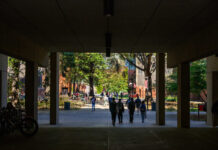But it was even hotter in Poland the following January. The 700-seat venue in Katowice could not accommodate the 3,000 people who hoped to see Mozart’s classic opera, a collaboration between the Opera Theatre program at the University of Louisville’s School of Music and the Szymanowski Academy of Music. The schools have an ongoing exchange program.
The production made for an interesting story of logistics and technology as students from two universities and two countries, speaking two languages and singing in a third performed before audiences on two continents.
But the story did not end with the closing of the curtains and rave response from the Polish audience. At 7:30 p.m., Feb. 13, people can come to UofL’s Comstock Auditorium in the School of Music building and see just what it took behind the scenes to make the show happen.
That is when Figaro, a documentary by independent producer Dan Schaefer, will premiere with a free screening.
Schaefer learned of the production by chance through his wife Susan Sittko Schaefer. A hair and make-up artist, she had worked with Michael Ramach, UofL opera theatre director, in other Louisville productions and wanted to work on the international project when she heard it was going to Poland.
This seemed very out of the ordinary and a good subject for a film, said Dan, a principal of his company FilmbyFrame studio, concept artist for Hollywood films and commercials and an associate producer on the recent Sony Pictures film, Deep Winter.
When he asked Ramach if he could film the event as a documentary, Ramach quickly answered yes.
Schaefer started filming the project during the first week of rehearsals in October of 2007, capturing the students from UofL and the Szymanowski Academy as they prepared for performances in Louisville and Katowice.
I returned to film the production throughout the last two weeks of production until the show was completed, Schaefer said. We continued on in January 2008 for two weeks in Poland filming the entire set up, rehearsals and final production.
The production was just as dramatic and complicated as the opera’s plot, Ramach said, as he assembled the two casts separated by an ocean.
Schaefer caught it all – the many funny moments and the traumas of what was a once-in-a-lifetime event for all involved.
It was compelling to watch the process of the show being built and all the different stages that must be accomplished, Schaefer said. You get a sense of just how hard the singers and designers work to bring the show together.
The close bond of the crew and singers made it fun, he said of the experience, even in spite of such trials as checking his camera through the several national borders they traveled to Poland.
After Figaro premieres, Schaefer said he plans to submit the documentary for consideration at film festivals this year and for television broadcast.


























